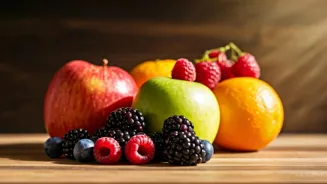Introduction to Diabetes
Diabetes is a chronic condition characterized by elevated blood sugar levels. The primary issue revolves around the body's inadequate production or ineffective
utilization of insulin, a hormone crucial for converting glucose into energy. Consequently, glucose accumulates in the bloodstream, potentially leading to a spectrum of health complications. A significant component of managing diabetes involves careful monitoring of dietary intake, including the strategic selection of fruits. The emphasis is on choosing fruits that have a minimal impact on blood sugar levels, allowing individuals with diabetes to enjoy a diverse range of foods without compromising their health. This careful selection process aids in preventing blood sugar spikes and maintaining overall well-being. Understanding the glycemic index (GI) and glycemic load (GL) of fruits is pivotal in making informed decisions. Fruits with a low GI and GL are generally preferred, as they release sugar into the bloodstream slowly, preventing sudden elevations in blood glucose.
Berries: A Healthy Choice
Berries, including strawberries, blueberries, raspberries, and blackberries, are renowned for their nutritional richness and suitability for individuals with diabetes. These fruits are naturally low in carbohydrates and possess a low GI, resulting in a minimal impact on blood sugar levels. They are packed with antioxidants, such as flavonoids and anthocyanins, which provide numerous health benefits. Incorporating berries into the diet can contribute to improved insulin sensitivity, helping the body to use insulin more effectively. Additionally, their high fiber content supports digestion and promotes a feeling of fullness, aiding in weight management. Berries are incredibly versatile and can be consumed in various ways—added to yogurt, blended into smoothies, or enjoyed as a standalone snack. Given their low sugar content, moderate consumption of berries offers a delicious and healthy way to satisfy cravings without causing significant fluctuations in blood glucose levels, making them an ideal choice for those looking to maintain a stable blood sugar profile.
Apples: The Everyday Fruit
Apples, a staple in many diets, are a great choice due to their moderate GI and high fiber content. The fiber in apples slows down the absorption of sugar, thereby preventing sudden spikes in blood sugar levels. Furthermore, apples are rich in essential nutrients, including vitamins, minerals, and antioxidants, contributing to overall health. Their low-calorie nature also makes them a suitable snack for those watching their weight. Apples can be enjoyed whole, sliced, or added to various recipes. The versatility and availability of apples make them an easily accessible and practical addition to a diabetes-friendly diet. When selecting apples, it's advisable to choose those with their skin on, as the peel contains a significant amount of fiber. The consistent consumption of apples, as part of a balanced dietary regimen, can support the maintenance of stable blood glucose levels, while also offering a range of health benefits.
Pears: Fiber-Rich Options
Pears are another excellent fruit choice for individuals with diabetes, thanks to their fiber content and moderate GI. The fiber helps to regulate blood sugar levels, and the nutrients present aid in overall health and digestion. Pears, when consumed in moderation, provide a satisfying snack that contributes to sustained energy levels without causing drastic blood sugar fluctuations. The vitamins and minerals present support various bodily functions and contribute to a healthy lifestyle. Like apples, pears are versatile, being suitable as a standalone snack or as an ingredient in a variety of dishes. Their availability and ease of incorporation into meals make them a practical addition to a diabetes-friendly meal plan. Opting for pears with the skin intact maximizes the intake of dietary fiber, further aiding in blood sugar management. Regular consumption of pears can be a part of a well-rounded diet that helps in maintaining healthy blood sugar levels and overall well-being.
Citrus Fruits: Refreshing Choices
Citrus fruits, such as oranges, grapefruits, and lemons, are known for their low GI and high vitamin C content. These fruits have a minimal impact on blood sugar levels, making them beneficial additions to the diets of people with diabetes. The high vitamin C content acts as an antioxidant and supports immune function, promoting overall health. Oranges and grapefruits can be enjoyed as snacks or integrated into meals, while lemons can be used in drinks or as flavor enhancers. The refreshing taste of citrus fruits offers a pleasant way to consume important nutrients without significantly affecting blood glucose. They contribute to hydration and provide essential vitamins and minerals. Consumption of citrus fruits, as a part of a balanced diet, can aid in the regulation of blood sugar, along with providing various health benefits. Their ease of inclusion in daily meals makes them a convenient option for people managing diabetes.
Cherries: Enjoy in Moderation
Cherries, while offering a number of antioxidants, should be enjoyed in moderation by individuals with diabetes. They have a relatively moderate GI. However, they also offer a good source of fiber and other nutrients that offer health benefits. Their unique flavor and versatility make them a delightful addition to a balanced diet, but portion control is key to avoid blood sugar spikes. The natural sugars in cherries, when consumed in reasonable amounts, can be a part of a healthy meal plan without causing major fluctuations in blood sugar levels. Cherries can be eaten as a snack or used in desserts and other food items. When incorporated into a meal plan with consideration for portion size and overall carbohydrate intake, cherries can be enjoyed safely, offering a balance of taste and nutrition.
Peaches: A Sweet Treat
Peaches offer a sweet and delicious treat with a moderate GI. Their fiber content aids in blood sugar regulation. Moreover, they're rich in vitamins and minerals, contributing to overall health. Peaches, in small portions, can be part of a healthy diet. They provide essential nutrients that support general well-being. Consumption of peaches can be incorporated into the diet, with a focus on portion control. This helps in preventing drastic changes in blood glucose levels. They can be enjoyed in multiple ways, such as raw, in salads, or as part of dessert recipes. Maintaining a balanced diet while incorporating peaches supports a healthy lifestyle. Peaches are a delightful choice for those managing diabetes, with an emphasis on mindful consumption.
Plums: Delicious & Nutritious
Plums are a great addition to a healthy diabetic diet. The fiber content in them contributes to the slower absorption of sugars, maintaining consistent blood glucose levels. Plums are full of vitamins and minerals, supporting overall health. Eating plums in moderation can be part of a balanced diet. They provide crucial nutrients and maintain wellness. Plums can be enjoyed as snacks or utilized in cooking. The ease of consumption makes them a practical choice for daily dietary needs. Consumption of plums helps in maintaining stable blood sugar levels when incorporated into meals. Moreover, they contribute to the overall health with their variety of nutrients.
Kiwi: Nutrient-Dense Option
Kiwis, with their low GI and high nutrient density, are an excellent choice for people with diabetes. They have a low glycemic impact on blood sugar levels. Also, they provide a wealth of essential vitamins and minerals. Kiwis offer fiber, supporting digestive health and promoting fullness. They are a delightful snack and can be incorporated into meals. Their nutritional benefits support a healthy diet. Consumption of kiwis aids in controlling blood sugar levels. Kiwis offer a variety of health advantages, making them a beneficial inclusion for individuals managing diabetes. They are easy to enjoy and provide a flavorful option.
Conclusion: Diet for Diabetes
Choosing the right fruits is an important aspect of diabetes management. The ten fruits discussed, including berries, apples, pears, citrus fruits, cherries, peaches, plums, and kiwis, offer a range of flavors and nutritional benefits. They have varying GI levels and are packed with essential nutrients. Individuals with diabetes should consider factors like portion size and overall dietary balance. Consistent monitoring of blood sugar levels, along with professional guidance, is essential. Eating these fruits in moderation can support stable blood sugar levels. Furthermore, it contributes to overall health and well-being. By making informed choices, people can enjoy delicious and healthy fruits as part of their meal plan. This supports a balanced lifestyle. A well-rounded diet, coupled with healthy habits, is key to effective diabetes management.














